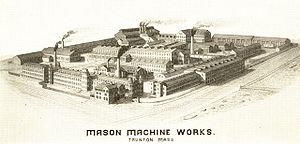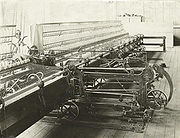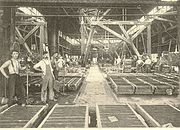
Mason Machine Works
Encyclopedia

Taunton, Massachusetts
Taunton is a city in Bristol County, Massachusetts, United States. It is the seat of Bristol County and the hub of the Greater Taunton Area. The city is located south of Boston, east of Providence, north of Fall River and west of Plymouth. The City of Taunton is situated on the Taunton River...
between 1845 and 1944. The company became famous for an early invention by its creator, William Mason
William Mason (locomotive builder)
William Mason was a master mechanical engineer and builder of textile machinery and railroad steam locomotives. He founded Mason Machine Works of Taunton, Massachusetts. His company was a significant supplier of locomotives and rifles for the Union Army during the American Civil War...
, the self-acting mule, first patented in 1840. The company also later produced locomotives, rifles during the American Civil War
American Civil War
The American Civil War was a civil war fought in the United States of America. In response to the election of Abraham Lincoln as President of the United States, 11 southern slave states declared their secession from the United States and formed the Confederate States of America ; the other 25...
, and later printing presses. However, the production of textile machinery would remain the company's core business during the late 19th century, until its decline in the 1920s.
Origins
The son of a blacksmith born in 1808 at Mystic, ConnecticutMystic, Connecticut
Mystic is a village and census-designated place in New London County, Connecticut, in the United States. The population was 4,001 at the 2000 census. A historic locality, Mystic has no independent government because it is not a legally recognized municipality in the state of Connecticut...
, William Mason
William Mason (locomotive builder)
William Mason was a master mechanical engineer and builder of textile machinery and railroad steam locomotives. He founded Mason Machine Works of Taunton, Massachusetts. His company was a significant supplier of locomotives and rifles for the Union Army during the American Civil War...
became a skilled master mechanic while still in his teens, working for various companies in the Killingly, Connecticut
Killingly, Connecticut
Killingly is a town in Windham County, Connecticut, United States. The population was 16,472 at the 2000 census. It consists of the borough of Danielson and the villages of Attawaugan, Ballouville, Dayville, East Killingly, Rogers, and South Killingly....
area that were involved with machinery for the growing textile industry.
In 1835, Mason moved to Taunton, Massachusetts
Taunton, Massachusetts
Taunton is a city in Bristol County, Massachusetts, United States. It is the seat of Bristol County and the hub of the Greater Taunton Area. The city is located south of Boston, east of Providence, north of Fall River and west of Plymouth. The City of Taunton is situated on the Taunton River...
to work for Crocker and Richmond, a company that made ring spinning frames for the cotton textile industry. While the firm failed in financial crisis of 1837, it was soon taken over by Leach and Keith. Mason was made foreman.
Textile Machinery

United States
The United States of America is a federal constitutional republic comprising fifty states and a federal district...
. It was a specialized art requiring tools, materials, skills and designs that had been gradually increasing through the early part of the 19th century. The ideas of early pioneers in the textile machine industry such as David Wilkinson
David Wilkinson (machinist)
David Wilkinson was a U.S. mechanical engineer who invented a lathe for cutting screw threads, which was an extremely important development in the development of the machine tool industry in the early 19th century....
at Pawtucket, Rhode Island
Pawtucket, Rhode Island
Pawtucket is a city in Providence County, Rhode Island, United States. The population was 71,148 at the 2010 census. It is the fourth largest city in the state.-History:...
and Paul Moody at Waltham, Massachusetts
Waltham, Massachusetts
Waltham is a city in Middlesex County, Massachusetts, United States, was an early center for the labor movement, and major contributor to the American Industrial Revolution. The original home of the Boston Manufacturing Company, the city was a prototype for 19th century industrial city planning,...
were constantly being tinkered with an improved upon during this time.
On October 8, 1840, Mason's greatest invention, the "self-acting mule" was patented. Competition required improvements and on October 3, 1846, he received a patent for "Mason's Self-acting Mule." The self-acting mule was a triumph of automation.
This device would become the industry standard for years to come.
With the failure of Leach and Keith in 1842, William Mason
William Mason (locomotive builder)
William Mason was a master mechanical engineer and builder of textile machinery and railroad steam locomotives. He founded Mason Machine Works of Taunton, Massachusetts. His company was a significant supplier of locomotives and rifles for the Union Army during the American Civil War...
convinced investors to help him establish his own company, the Mason Machine Works. In 1845, new buildings were erected and the plant became the largest one devoted to the manufacture of machinery in the country. It made cotton machinery, woolen machinery, machinists' tools, blowers, cupola furnace
Cupola furnace
A Cupola or Cupola furnace is a melting device used in foundries that can be used to melt cast iron, ni-resist iron and some bronzes. The cupola can be made almost any practical size. The size of a cupola is expressed in diameters and can range from . The overall shape is cylindrical and the...
s, gearing, shafting, and railroad car wheels made with spokes.
The Mason Machine Works would become most important company in Taunton, Massachusetts
Taunton, Massachusetts
Taunton is a city in Bristol County, Massachusetts, United States. It is the seat of Bristol County and the hub of the Greater Taunton Area. The city is located south of Boston, east of Providence, north of Fall River and west of Plymouth. The City of Taunton is situated on the Taunton River...
for much of the 19th century.
Locomotives

The company would construct 754 steam locomotives between 1853 and 1889. However, after William Mason's death in 1883, the firm would mostly concentrate on its core business of textile machinery.
Two locomotives built by Mason have been preserved, both fully operational. One is the Baltimore and Ohio Railroad
Baltimore and Ohio Railroad
The Baltimore and Ohio Railroad was one of the oldest railroads in the United States and the first common carrier railroad. It came into being mostly because the city of Baltimore wanted to compete with the newly constructed Erie Canal and another canal being proposed by Pennsylvania, which...
's number 25
William Mason (locomotive)
"William Mason" is a 4-4-0 steam locomotive currently in operation at the Baltimore and Ohio Railroad Museum in Baltimore, Maryland, USA. It was built for the Baltimore and Ohio Railroad, carrying that railroad's number 25...
, a 4-4-0
4-4-0
Under the Whyte notation for the classification of steam locomotives, 4-4-0 represents the wheel arrangement of four leading wheels on two axles , four powered and coupled driving wheels on two axles, and no trailing wheels...
type engine built in 1856, which was later named in honor of Mason. It is currently at the Baltimore and Ohio Railroad Museum. The other is Hecla & Torch Lake Railroad Number 3, a 0-6-4
0-6-4
Under the Whyte notation for the classification of steam locomotives, 0-6-4 represents the wheel arrangement of no leading wheels, six powered and coupled driving wheels on three axles, and four trailing wheels on two axles....
engine of the Mason Bogie
Mason Bogie
The Mason Bogie is a type of articulated steam locomotive suited for sharp curves and uneven track, once commonly used on narrow gauge lines in the United States...
design built in 1873, currently at the Henry Ford Museum.
Civil War Rifles and Printing Presses

After the war, the company again focused on producing high-quality textile machinery and locomotives. The factory expanded to more than 10 acres (40,468.6 m²) near the western end of downtown Taunton.
In 1879, Mason's reputation for quality workmanship let to a contract to manufacture of the Campbell printing press
Printing press
A printing press is a device for applying pressure to an inked surface resting upon a print medium , thereby transferring the ink...
, originally patented and built in Brooklyn, New York.
Decline and Legacy
With the demise of the northern textile industry during the 1920s, Mason was reduced to producing mostly spare parts for the machines which it had sold previously to an ever-decreasing number of textile manufacturers. By the 1930s, portions of the site were occupied by Grossman's Lumber Company and the Southern New England Terminals trucking company.The Mason Machine Works finally went out of business in 1944.
Grossman's continued to occupy much of the former Mason property until late 1960s, when the property became earmarked for demolition by the City of Taunton, as part of an urban renewal project. The site was vacated by October 1969.
However, with demolition slated to begin, the complex was destroyed by fire on December 30, 1970.
Today the site is occupied by a bus depot and garage, an apartment building and other businesses. A portion of the site remains open and has not been redeveloped, due to likely soil contamination issues associated with the Machine Works operations.
See also
- Mason BogieMason BogieThe Mason Bogie is a type of articulated steam locomotive suited for sharp curves and uneven track, once commonly used on narrow gauge lines in the United States...
- Draper CorporationDraper CorporationThe Draper Corporation was once the largest maker of power looms for the textile industry in the United States. It operated in Hopedale, Massachusetts for over 130 years.-Beginnings:...
- Paul Moody
- Spinning muleSpinning muleThe spinning mule was a machine used to spin cotton and other fibres in the mills of Lancashire and elsewhere from the late eighteenth to the early twentieth century. Mules were worked in pairs by a minder, with the help of two boys: the little piecer and the big or side piecer...
- Taunton Locomotive Manufacturing CompanyTaunton Locomotive Manufacturing CompanyThe Taunton Locomotive Manufacturing Company was one of the earliest firms in the United States established especially for the manufacture of steam locomotives. Located in Taunton, Massachusetts, the company was organized in 1849 and incorporated the following year by William A. Crocker, Willard W....
- Whitin Machine WorksWhitin Machine WorksThe Whitin Machine Works was founded by Paul Whitin and his sons in 1831 on the banks of the Mumford River in South Northbridge, Massachusetts. The village of South Northbridge became known as Whitinsville in 1835, in honor of its founder....

